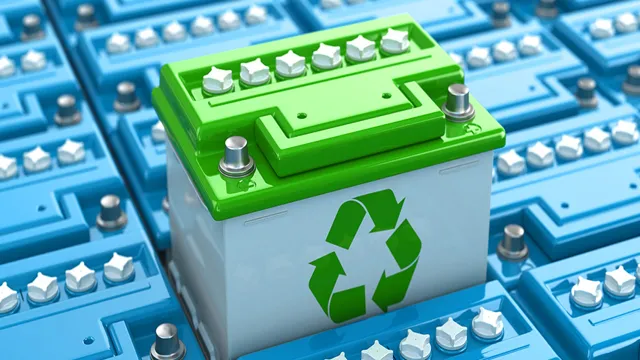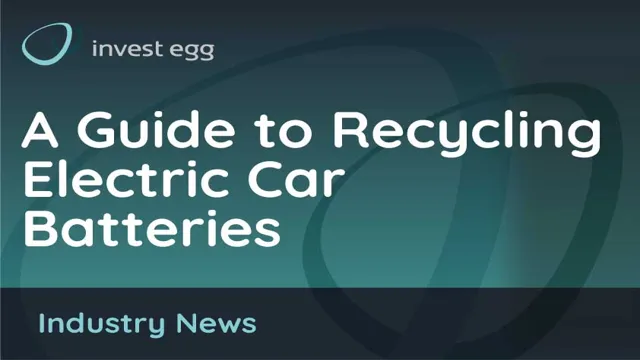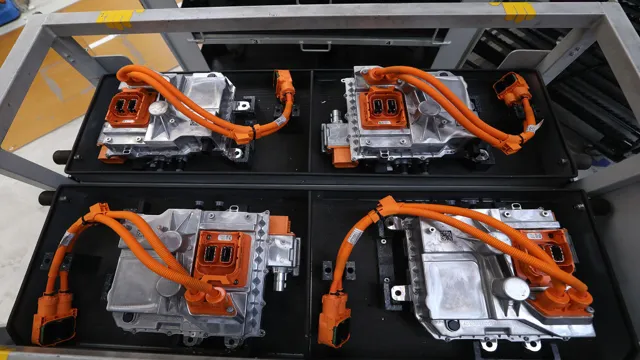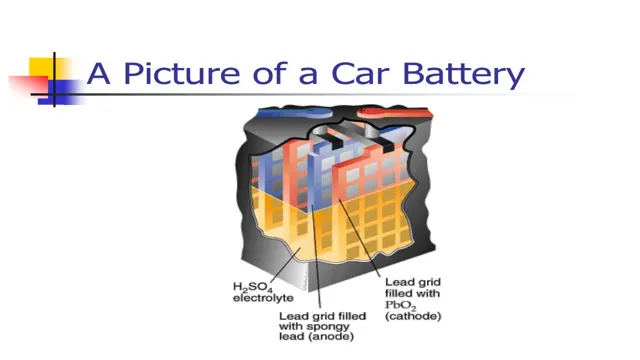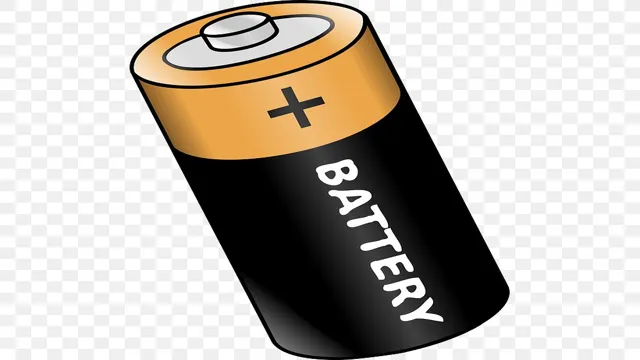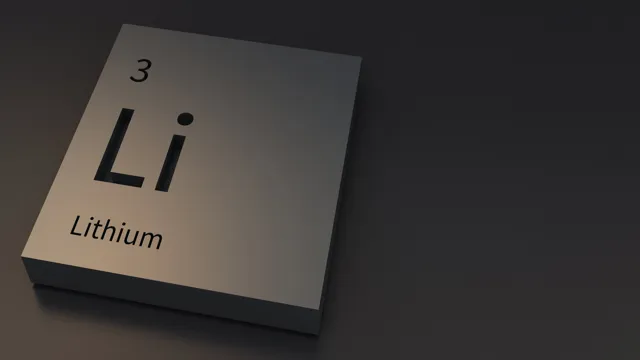Reviving The Future: Exploring the Potential of Recycling Electric Car Batteries
If you’re considering switching to an electric car, you may be wondering what happens to the batteries once they reach the end of their lifespan. Recycling electric car batteries is a crucial process that not only helps protect the environment but also ensures that the valuable materials inside the batteries are reused. Unlike traditional car batteries, which are often discarded into landfills, electric car batteries contain a variety of valuable metals, including cobalt, lithium, and nickel.
These materials can be extracted and recycled into new batteries, helping to reduce the demand for new raw materials. In this blog, we’ll take a closer look at the important process of recycling electric car batteries and its benefits for the environment.
Why Recycling is Important
Electric car batteries are designed to last for many years, but eventually, they will need to be replaced. When this happens, it’s essential that they are recycled properly. Recycling electric car batteries is crucial for several reasons.
Firstly, it helps to conserve natural resources, as the materials used to make the batteries are often scarce and in high demand. Additionally, recycling helps to reduce the amount of waste in landfills, which is better for the environment overall. So, can you recycle an electric car battery? The answer is yes.
Many companies now specialize in the recycling of electric car batteries, and they use processes that are both effective and efficient. By choosing to recycle your old battery, you can ensure that it’s disposed of safely and responsibly, while also helping to reduce your carbon footprint. Overall, recycling electric car batteries is an essential practice that benefits not only the environment but also future generations.
Environmental Impact of Disposing Batteries
When we discard batteries, we probably don’t think twice about the impact it could have on the environment. However, improperly disposed batteries can have a significant impact on our planet. Batteries contain toxic chemicals and heavy metals such as lead, mercury, and cadmium, which can cause harm to the environment when they begin to degrade.
These harmful chemicals can seep into soil and water sources, polluting them and posing a danger to plants and animals. Therefore, recycling batteries is incredibly important. Recycling allows us to extract the valuable materials from batteries without releasing toxic chemicals into the environment.
The metals and chemicals found in batteries can be reused for new batteries, reducing the need for mining new materials. Recycling batteries also prevent them from ending up in landfills where they can harm the environment. As consumers, it is our responsibility to properly dispose of our batteries.
This means finding a recycling facility that accepts batteries in your area. Fortunately, many municipalities and stores offer battery recycling programs. So, the next time you need to dispose of batteries, remember the impact improper disposal can have on the environment and recycle them to reduce your carbon footprint.
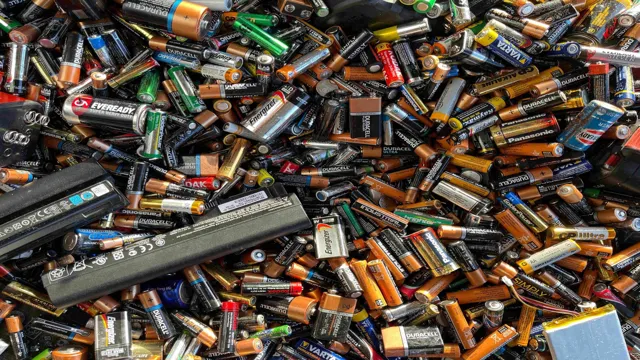
Benefits of Recycling Batteries
Recycling batteries is crucial for the environment, and here are some of the benefits that come from it. Firstly, recycling reduces the number of batteries that end up in landfills where they can cause significant harm to the environment. These batteries can leak toxic chemicals such as mercury, lead, and cadmium, which can contaminate the soil and groundwater, leading to harmful consequences for ecosystems and human health.
Secondly, recycling batteries conserves resources by extracting valuable materials from old batteries, such as lead and nickel, which can be reused in new batteries or other products. By doing so, this process conserves energy, reduces greenhouse gas emissions, and allows for less mining of non-renewable resources. So, the next time you have a dead battery, consider taking it to a recycling center to help protect the planet.
How are Electric Car Batteries Recycled?
Yes, you can recycle an electric car battery. In fact, recycling is a crucial step in the life cycle of electric car batteries. When batteries come to the end of their lifespan, they still contain valuable materials such as lithium, cobalt, and nickel.
Instead of letting these materials go to waste in landfills, recycling facilities can extract and reuse them. The recycling process typically involves disassembling the battery pack, shredding the cells, and separating the valuable materials from the waste. These materials can then be sold to manufacturers of new batteries or other products.
Recycling an electric car battery not only prevents waste but also reduces the need for mining and extraction of new raw materials, making it a more sustainable solution for our environment.
Battery Breakdown and Collection Process
When it comes to electric car batteries, recycling is a crucial process that helps to reduce waste and protect the environment. The breakdown and collection of these batteries involve several steps, starting with the removal of all hazardous materials such as liquids and gases, before the battery is shredded into small pieces. From there, a hydrometallurgical process is used to extract the valuable metals such as cobalt, nickel, and lithium, which can be sold and reused in the production of new batteries.
One of the key challenges in this process is the lack of standardization, as different battery manufacturers use different materials and designs, making it harder to develop a universal recycling process. Nonetheless, efforts are being made to develop innovative procedures that can handle the various types of batteries on the market. By recycling these batteries, we can extend their life cycle, reduce the environmental impact of transportation, and ensure that valuable resources are used in an efficient and sustainable way.
Battery Components Recovery Process
Recycling Electric Car Batteries With the rising popularity of electric cars, there has been a growing concern about how to deal with their batteries at the end of their life cycle. These batteries are made up of multiple components, each with its own value, and therefore it is essential to recycle them effectively. The recycling process for electric car batteries begins by removing the valuable components such as cobalt, nickel, and lithium from the battery pack.
These metals are then melted down and sold for reuse. The remaining components of the battery, including the plastic casing and electrodes, are broken down into smaller pieces and recycled. By recycling these batteries, we prevent them from ending up in landfills and polluting the environment.
Furthermore, the recycled components can be used to manufacture new batteries, reducing the need for new materials. The process of recycling electric car batteries helps in reducing the environmental impact of electric vehicles and promoting sustainability.
Reusing Recycled Battery Components
When it comes to electric car batteries, one of the big questions is how they can be recycled. The good news is that, while it can be a complex process, electric car batteries are highly recyclable. This is because they are made up of many valuable and reusable components, such as metals like nickel, cobalt, and lithium.
To recycle an electric car battery, the first step is to remove the valuable metals and separate them from any non-recyclable parts. Once this is done, the metals can be reused in a variety of ways, including making new batteries or other products. The process also often involves reusing recycled battery components, which can help reduce waste and further extend the life of the original battery components.
Overall, while recycling electric car batteries can be a challenging process, it is an important one in protecting the environment and conserving valuable resources.
Challenges of Recycling Electric Car Batteries
Can you recycle an electric car battery? While electric cars are a greener alternative to traditional gasoline-powered vehicles, their batteries pose a challenge when it comes to recycling. These batteries are large and complex, made up of a range of materials including lithium, cobalt, nickel, and aluminum. While some of these materials are highly valuable, others are more difficult to recycle or dispose of safely.
One of the main barriers to recycling electric car batteries is the lack of infrastructure for this process. There simply aren’t enough recycling facilities equipped to handle these batteries at scale. Additionally, the high cost of recycling and the potential safety risks associated with handling hazardous materials further complicates the process.
As electric car adoption continues to rise, we must find sustainable and safe ways to handle their batteries at the end of their lifecycle.
High Cost of Recycling Batteries
Recycling electric car batteries is becoming increasingly crucial as we move towards a more sustainable future. However, one of the biggest challenges in recycling these batteries is the high cost associated with it. The materials used in electric car batteries, such as lithium, cobalt, and nickel, are expensive and difficult to extract.
This means that the process of recovering and recycling these materials is complex and requires specialized equipment and expertise, which can be costly. Additionally, the lack of standardization in battery design and composition can further complicate the recycling process, making it even more expensive. Despite these challenges, efforts are being made to improve the efficiency and affordability of battery recycling to promote more sustainable practices in the automotive industry.
Difficulty in Standardizing Recycling Process
Recycling electric car batteries can be a challenging process due to the difficulty in standardizing the recycling process. Unlike traditional lead-acid batteries, electric car batteries are composed of a variety of materials such as lithium, nickel, cobalt, graphite and more. These materials are not only complex to process, but they also need to be recycled appropriately to avoid any adverse environmental impacts.
Moreover, to recycle these materials, a specific level of expertise and infrastructure is required, which may not always be available in all regions. In addition, the lack of a uniform standard for recycling electric car batteries has created a fragmented market, with some recyclers using different techniques than others. As a result, this leads to a lack of consistency in the quality of recycled materials, which could pose safety concerns for end-users.
Therefore, establishing a uniform set of standards for recycling electric car batteries is crucial to ensure the materials are recycled effectively, safely, and sustainably.
Conclusion and Future of Battery Recycling
While the initial answer to the question “can you recycle an electric car battery?” may seem straightforward, in reality, the answer is not so simple. Yes, electric car batteries can certainly be recycled and repurposed, but the process is not yet foolproof or widely accessible. However, with advances in technology and increasing awareness of the importance of sustainability, it’s likely that more and more options for recycling electric car batteries will become available in the coming years.
So while the answer to this question may not be currently plain black and white, one thing is certain – the future is looking bright for a more eco-friendly automotive industry.
FAQs
What happens to electric car batteries once they no longer function in a vehicle?
Electric car batteries can be recycled or repurposed for use in stationary energy storage systems.
How is an electric car battery recycled?
The recycling process typically involves shredding the battery and then using hydrometallurgical techniques to extract valuable metals such as copper, nickel, and cobalt.
Can all components of an electric car battery be recycled?
While most components can be recycled, some materials such as plastic and electrolytes may not be recyclable. These materials are typically processed through incineration or landfill.
What is the environmental impact of recycling electric car batteries?
Recycling electric car batteries can have both positive and negative environmental impacts. On one hand, it helps reduce the demand for scarce resources and reduces the amount of waste in landfills. On the other hand, the recycling process can release harmful pollutants and require significant amounts of energy.
